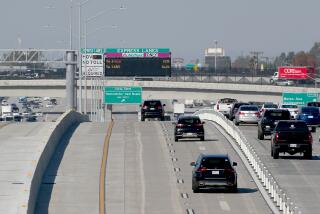EPA orders BMW to lower fuel economy claims on four Mini models
The Environmental Protection Agency is continuing its crackdown on auto companies that issue inflated fuel economy claims for their vehicles, this time ordering BMW to lower the estimates for four of its 2014 Mini Cooper cars.
During an EPA audit of the fuel economy ratings on the window stickers of new Mini Coopers, the agency derived values that differed from those submitted by the automaker for certification.
The EPA told BMW, which owns the Mini brand, to conduct new emissions and fuel economy testing. The EPA also did its own tests at its National Vehicle and Fuel Emissions Laboratory in Ann Arbor, Mich.
The results demonstrated that BMW had inflated the fuel economy claims for the three-door models of the Mini Cooper and the Mini Cooper S by 1 mile per gallon for both city driving and combined city and highway driving.
The ratings for highway-only driving were inflated by 1 to 4 miles per gallon depending on the vehicle and whether it had an automatic or manual transmission.
The new ratings for the Mini Cooper with automatic transmission are 32 mpg for combined driving, 28 for city driving and 39 for highway driving. For the automatic Mini Cooper S, the ratings are 30 mpg for combined driving, 26 for city and 35 for highway.
The new ratings for the Mini Cooper with manual transmission are 33 mpg for combined driving, 29 for city driving and 40 for highway driving. For the manual Mini Cooper S, the ratings are 28 mpg for combined driving, 24 for city and 34 for highway.
The EPA has ordered BMW to put the lower ratings on the window stickers of the cars.
“Fuel economy values matter to consumers and automakers,” said Christopher Grundler, director of the EPA’s Office of Transportation and Air Quality. “To provide consumers with the most accurate, reliable and repeatable fuel economy values, we are continuing to strengthen our oversight to ensure fair competition among automakers.”
More carmakers are getting into trouble over their fuel economy claims. Hyundai, Ford, Kia, Mercedes-Benz and BMW have all had to lower the fuel economy of various models in recent years.
The EPA’s National Vehicle and Fuel Emissions Laboratory conducts fuel economy testing on vehicles each year to ensure that their performance matches the mileage and emissions data automakers submit to the EPA. The agency said the audits “are part of the oversight program that helps ensure all carmakers are following the same procedures for calculating mileage estimates.”
Follow me on Twitter (@LATimesJerry), Facebook and Google+.







